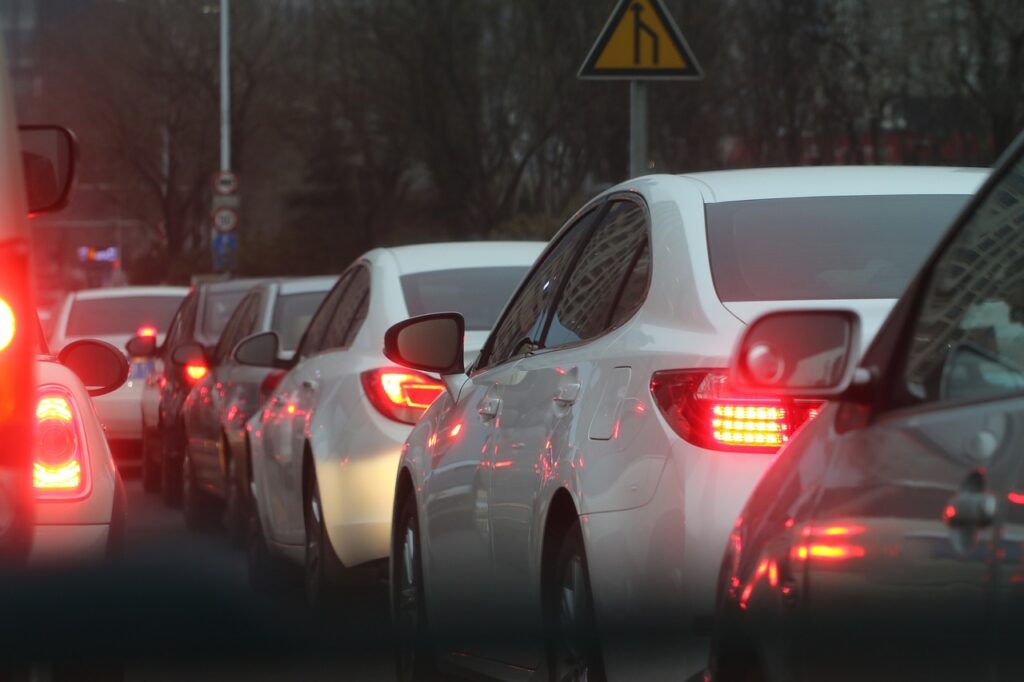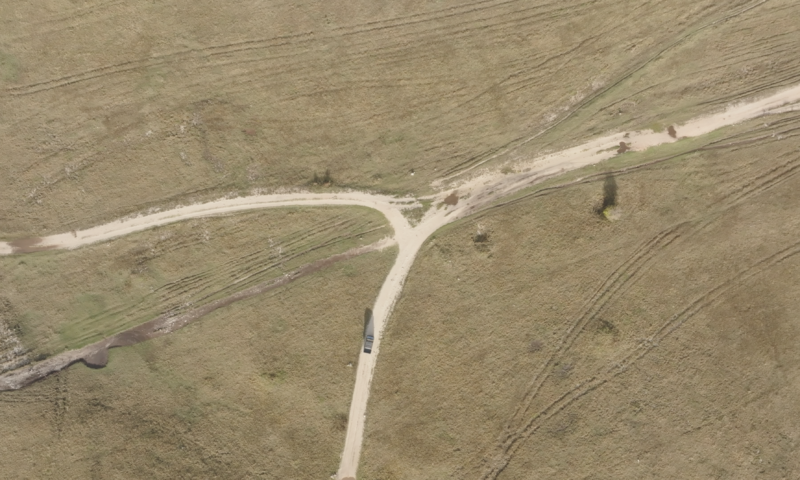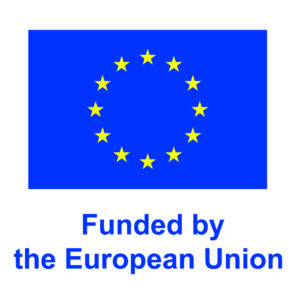This story was originally published in November 2023 by Voxeurop. It was produced with support from production grants from the European Excellence Exchange in Journalism project.
How weak Euro 7 standards could cost up to €100 billion in health and environmental damage by 2050
The policy advisers of the European Commission sound the alarm. Weak and delayed enforcement of the Euro 7 standards, setting new requirements for car emissions, may very well cause an estimated €100 billion health and environmental damages until 2050 due to excess pollution from internal combustion engines (ICE). Estimates are based on analysis performed exclusively for Voxeurop by the Commission consultants, the Consortium for ultra-low vehicle emissions (CLOVE). Europe’s top automotive experts scrutinised the watered down text agreed at the end of September by the 27 governments at the Council (the EU co-legislator together with the European Parliament elected by citizens). This loss of €4 billion a year could be averted if European carmakers forfeited a tiny fraction of their annual fortune, doubled to €73 billion since 2019, to produce cleaner models.
Through its vote at the plenary session on 9 November, the European Parliament holds the responsibility to confirm or overturn the Council decision squandering the EU ambition to crack down on the toxic legacy of Dieselgate. The scandal in 2015 exposed manufacturers’ tricks to circumvent the rules capping tailpipe fumes through doctoring the levels of NO (or NOx, Nitrogen Oxide), one of the primary contaminants released by combustion (mostly diesel) engines. NO is rapidly converted into Nitrogen Dioxide (NO2), which causes 49,000 premature deaths per year in the EU and indirectly contributes to the formation of Particulate Matter (PM) which is even more harmful: the estimated number of excess annual deaths is 238,000.
Half of these premature deaths could be avoided if cars had the same on-the-road emissions as reported in the laboratory tests conducted for the approval of new models. Although in the wake of Dieselgate the EU tightened its surveillance rules by coupling the traditional laboratory tests with mandatory driving tests on the road, legal emission limits are often exceeded also by new car models.
Along with cases of clear violations and lack of controls by national authorities, excess emissions mostly happen because of legislative loopholes: indeed, the tests for the approval of new models are not required to capture all real driving conditions (for example cold environments and short trips) and measurements do not cover the entire vehicle’s lifetime.
That is why the Euro 7 standard proposed by the Commission aimed to tighten both emission limits and testing procedures for cars, vans and heavy-duty vehicles like buses and lorries.
However, the Council approved a text which essentially continued with the almost 10-year-old Euro 6 norms for exhaust emissions (with tighter limits only for heavy-duty vehicles), while implementing limits for PM from brakes and tyres and requiring an emissions monitoring system ensuring long term compliance. Diesel-fuelled cars are still allowed to pollute more than petrol ones.
Carmakers obtain the permit to over-pollute
“Spain, holding the Council rotating presidency during the second semester of 2023, played a key role in killing Euro 7,” said Anna Krajinska, Manager on vehicle emissions and air quality at the NGO Transport & Environment. “On the first day of the Presidency, Renault confirmed a huge investment in ICE cars in Spain and only days after the proposals were agreed in Council, Spain’s trade minister boasted of how a weak Euro 7 will help secure further carmaker investment in Spain.”
Early this year Volkswagen (VW) and Stellantis also announced big plans on hybrid and Electric Vehicles (EVs) in the Iberian country. Through the silent barter offered by Trade Minister Héctor Gómez the industry received a gift worth billions in avoided eco-expenditure. This will lead to around 47-58% less public benefits up to 2050, compared to the Commission’s proposal, according to forecasts provided to Voxeurop by CLOVE consultants which advised the Commission on the Euro 7 policy options.
“In exchange for every extra billion saved by a few carmakers, millions of European citizens will suffer serious diseases, hospitalisations and other social costs, shouldering the €27 billion paid to shareholders between 2019 and 2023 by the five largest automotive groups in Europe (VW, BMW, Mercedes-Benz, Stellantis and Renault),” Krajinska added. “Member states should be ashamed for putting profiteers’ interests over the health of their own citizens.”
These comments measure the success of the pressures exerted on the EU institutions by the European Car Manufacturers Association (ACEA), currently chaired by Renault CEO Luca de Meo. The Brussels-based industry platform increased its lobbying spending since the discussions on Euro 7 started in 2018 with preliminary recommendations made by the CLOVE consortium.
Confidential correspondence seen by Voxeurop revealed how carmakers convinced EU high-ranking officials to weaken their Euro 7 plans from the outset with the argument that investments should prioritise the transition to emissions-free electromobility by 2035.
“We have invested significantly in technology for e-mobility to the tune of more than 250 billion,“ said an ACEA spokesperson.
“The Commission ask us to work towards the 2035 zero emissions target while at the same time converting to Euro 7 through committing resources and engineers back to combustion engine technology which will become obsolete in just a few years from now,” Matthias Johansson, Head of Public Affairs at carmaker Volvo, told Voxeurop. Volvo intends to produce only EVs as of 2030.
Indulging in lengthy behind-the-scenes consultations with ACEA, the Commissioner for Internal Market Therry Breton, former lobbyist for the tech company Atos, of which he was the CEO, and frontrunner candidate as the next EU Commission President, resolved to present a formal proposal only in November 2022, with a one-year delay. The text set looser requirements (i.e. emission limits to 60 mg/km) than those outlined in the greener policy options recommended by CLOVE (limits 20 to 30 mg/km).
The most balanced option would have decreased nitric oxide (NOx) emissions from cars and heavy-duty vehicles by an average 44% until 2050. The projected savings lost 18% with the “Breton” text, according to a study on the impact of Euro 7 on air quality, decreasing to 35-40%. They further shrunk to 15-25% with the EU Council decision (bringing to zero cars emissions reduction), according to estimates shared by CLOVE consultants with Voxeurop.
A study by the research organisation International Council for Clean Transportation (ICCT) demonstrates that the proposal availed by Breton, if enforced timely in 2025, would cut 1 million tons of emissions and would prevent 7,300 premature deaths until 2050 (with 56% attributed to reductions in emissions from heavy-duty vehicles). As a result of the industry’s time-wasting strategy and the vote delayed by the European Parliament centre-right majority, the proposed application date has been postponed to 2026/2027 for cars and 2028/2029 for heavy-duty vehicles. This extension may cause over 1,700 premature deaths in the EU.
Test procedures and reduction efforts for all other pollutants have also been progressively softened throughout the lawmaking process, including ultrafine particles, particulate matter (PM) from brakes and ammonia (NH3, which contributes to PM, but so far unregulated) which has been totally scrapped in the Council deal.
“The Euro 7 that EU-27 ministers agreed on for cars and vans is akin to greenwashing,” said Felipe Rodriguez, Deputy Managing Director at the Europe office of the ICCT. “It keeps the existing test conditions and emissions limits of Euro 6 but calls it Euro 7 because new brake and tyre abrasion limits would apply.”
“It is inexplicable that cleaner cars have to be sold in China and the U.S. by European manufacturers than in Europe,” said Krajinska.
U.S. and Chinese laws set binding requisites similar to the Euro 7 standards proposed by the Commission that carmakers are opposing.
“The US approach is less stringent than the EU’s in a number of instances, for example emission limit values achieved by vehicles are measured under controlled lab tests, not under the variability of on-road driving,” said an ACEA spokesperson, who nonetheless admitted that the “effectiveness (i.e. of pollutant emissions standards) should ultimately be measured by how a vehicle performs on the road.”
The amendments adopted on 12 October by the EU Parliament Environment Committee largely followed the Council position. Emails seen by Voxeurop were addressed to Members of the European Parliament by the German company Daimler Truck ahead of the vote in the committee and by ACEA ahead of the plenary, scheduled on 8 November. Both messages aimed to influence the bill. Particularly the Czech member of the populist ANO party Ondrej Kovarik (affiliated to the centrist Renew group), copy-pasted the request to restore the Euro 6 limits, submitted by Alessandro Vascotto, Head of Public affairs at ACEA, into an amendment that he then circulated to secure sufficient signatures for a vote.
Renew is part of the majority centre-right coalition at the European Parliament, together with the European Conservatives and Reformists Group which includes the Euro 7 rapporteur Alexandr Vondra (also Czech – a member of the ruling ODS party) and the centre-right European People’s Party. The coalition appointed as negotiator on the file the German Jens Gieseke, former co-chair of the special investigation committee on Dieselgate. He drafted the Committee recommendations in 2017 calling for the elaboration of the Euro 7 standard that he is now trying to dismantle by leading the fight against the Commission’s proposal.
Taxpayers’ money wasted in unused clean technology
A final victory for Big Auto would undo five years of valuable work, funded by taxpayers’ money (through the EU budget), to identify the most cost-effective regulatory options. Under a formal mandate from the Parliamentary Special Committee investigating Dieselgate, the Commission has committed considerable human resources and spent €3.9 million in consultancy for Euro 7 and its impact on air quality as well as over €80 million in projects aiming to demonstrate that pollution can be reduced through adopting already existing and affordable technical solutions. “By killing off Euro 7 by opposing the mandatory use of such technology, carmakers have wasted all the taxpayer funding they received,” said Krajinska.
Indeed many of the EU-funded projects, worth around €56 million, involved brands such as Mercedes-Benz (formerly Daimler), Jaguar-Land Rover, Volvo, Fiat, Iveco and Renault. The French company’s CEO De Meo currently leads the ACEA battle against tighter emissions reduction, but for many years it advocated for the opposite through using EU funding for its own in-house engineering. Renault was the most successful applicant to programs specifically requested by member states to improve the environmental performance of diesel engines.
The Dieper project started in 2016 while Renault, which scored the farthest out of compliance with Euro 6 standards, was audited by the Dieselgate Committee of the European Parliament. Dieper demonstrated that noxious compounds (particularly ultra-fine particles) can be lowered below the obsolete Euro 6 limits. After speeding the €8.6 million provided by the EU, the French giant announced its intention to “pursue various of the Dieper developments to serious production”, without any commitment to produce less polluting vehicles.
Earlier on, from 2015 to 2018 the group had conducted a similar project with the Reward consortium, funded by the Commission with €10 million, to “cost-effectively produce cleaner, highly efficient Diesel […] technologies for future cleaner […] passenger cars” and to “prove […] compliance with stricter post Euro 6 limits”. These promises amounted to nothing when last May De Meo publicly stated that the proposed Euro 7 (which precisely sets more stringent limits for future cleaner cars) “would require us to put a lot of money on things which have no future.”
With a view to the Euro 7 implementation, the European association of catalyst suppliers (AECC) conducted tests in collaboration with CLOVE, proving that limits well below those of the Euro 6 can be achieved, also in very low temperatures. AECC used a consolidated technology (electrically heated catalyst) which has been ready for many years but never commercialised. The tool can limit NO2 release during the first kilometres when the engine is still cold and emissions peak above the legal limits, before exhaust cleaners warm up and turn on.
To force carmakers to use this equipment, the Commission wanted to include in the approval tests trips shorter than 16 Km, which is the minimum mileage to start measuring the emissions under Euro 6. Governments decided, instead, to continue allowing carmakers to spew unlimited NOx over such distance, which makes most of the short driving trips in cities (an average 20 Km a day) pollution bombs .
“Carmakers have signed contracts with us to make the adjustments needed to comply with the Euro 7, before turning to their political blockade,” said a public affairs director of an AECC member company on condition of anonymity.
Car price vs. health price
Official EU Commission’s sources and updated calculations provided to Voxeurop by CLOVE suggest that with the proposed Euro 7 the price per car would not increase more than €200-250 on average. According to a survey conducted by YouGov in 2021, people would be willing to pay over double the amount for cleaner models in Italy, France, Spain and Germany, which together account for 68% of new sales across Europe.
The Commission’s notes based on the CLOVE projections, seen by Voxeurop, reveal that the total cost that carmakers could pass on consumers would be close to €30 billion until 2050. This amount is far less than the €145 billion in net welfare (benefits-cost) expected from decreasing road pollution. Each euro invested in Euro 7 would save 5 euro on healthcare and environment costs.
“Our cost-benefit analysis is based on transparent modelling assumptions and a thorough dialogue with all stakeholders, including automotive suppliers such as AECC, and carmakers,” said Professor Zissis Samaras, coordinator of CLOVE and co-founder of Emisia, a spin-off company of the Laboratory of Applied Thermodynamics at the Aristotle University of Thessaloniki, which advises industry and policymakers on sustainable and cost-efficient transport technologies. “I must say that carmakers did not provide information on the possible Euro 7 costs when asked in the framework of stakeholder consultation launched by the European Commission.”
Eventually lawmakers preferred to believe in the danger of a socio-economic breakdown taunted by the automotive sector which accounts for a considerable share of the EU wealth: over 7% of EU GDP, 12.9 million workers (8.3% of all manufacturing jobs in the EU) and €392.2 billion in tax revenue for European governments.
“Unfortunately, the political debate was never really about air quality or about technical or economic feasibility: the car industry has succeeded in centering it on the price of a car,” Dutch MEP Bas Eickhout, negotiator on Euro 7 for the Greens Group, told Voxeurop. “Their alternative claims and figures found their way into the minds of most politicians and they are now happy to trade public health for a marginal increase of the price of a car.”
ACEA-paid studies totally invert the cost-benefit perspective, indicating that stringent obligations would raise the price per car by up to €2,000 (€12,000 for heavy-duty vehicles) while contributing very little to pollution reduction. The latter would supposedly decrease by a larger extent through shifting the old fleet (i.e. Euro 4 and 5) to Euro 6 and to zero emissions electric vehicles (EVs).
“Euro 6 covers over 95% of statistically realistic on-road driving events and conditions,” said an ACEA spokesperson. “The Euro 7 proposal aims to extend coverage to the minority of possible driving events that would require an unnecessary level of effort and cost to address.”
Emissions can be up to 475% higher outside the parameters of the approval tests (that ACEA defines as “minority events”), resulting in unaccounted NOx outflow over 20% of the driven distance, as found by the European Commission’s Joint Research Center.
The biased industry approach
The industry claims about dramatic price increase, based exclusively on manufacturers inputs and questionable methodology, were debunked by an independent review by CLOVE. CLOVE members are regularly contracted by carmakers to optimise their environmental performances and therefore are very familiar with emissions-related engineering.
The report by Frontier Economics, commissioned by ACEA, inflates projected costs based on carmakers’ assumptions that complying with the Euro 7 proposed by the Commission is not feasible without installing automatic gearboxes (reportedly decreasing emissions), developing new technologies, upgrading catalysts and wasting more fuel.
“Automatic transmission has steadily increased over the last decade and projections for 2026 show that the trend will continue, independently of Euro 7 introduction, letting alone that CLOVE car emissions database and AECC tests show the same compliance of manual and automatic transmission with the limits proposed by the Commission,” pointed out Zissis Samaras, whose expertise has been trusted in many occasions by ACEA itself through consulting contracts signed with EMISIA. “There is no need for new exhaust emission control technologies since those which are already developed and particularly catalysts size increase and improved filters for gasoline and diesel vehicles are sufficient to reduce emissions with no additional fuel consumption, stressing that carmakers are constantly improving engine efficiency regardless of Euro 7.”
Also, new analysis by Transport & Environment shows that Europe’s five biggest carmakers have already raised the prices of their cheapest models since 2019 by an average of 41% (almost double the cumulative rate of inflation during this period), independent of the Euro 7 adoption.
“Carmakers have raised prices for consumers beyond inflation to substantially bolster their own profits and yet they have fought tooth and nail against life saving anti-pollution technologies costing only €200 per car,” said Krajinska.
ACEA’s attempt to dismiss the Euro 7 health benefits is also disproved by expert analysis, confidential documents and emissions data.
“In principle, the industry proposal to minimise pollution through converting the whole fleet to Euro 6 and distributing the efforts among the different sectors contributing to urban emissions (including house heating) would be more cost-effective than imposing a Euro 7 standard alone,” a scientist who has contributed for several years to air quality studies for the Commission told Voxeurop, under condition of anonymity. “But this is a theory as long as governments do not enforce that current cars, vans and trucks are actually as clean as they are supposed to be. Thus a new Euro 7 limit stage emerges as an alternative solution.”
Minutes of a meeting of the Forum for Exchange of Information on Enforcement held on 29 September 2022, seen by Voxeurop, show that national surveillance authorities have failed so far to force carmakers to recall from the market those Euro 6 vehicles breaching the emission limits. These vehicles are equipped with on board software which switch off the NOx control systems for reasons considered unacceptable by the European Court of Justice (e.g. low temperatures or engine durability).
With its ruling of July 2022, the Court banned such softwares (technically ‘defeat devices’) as cheating methods to put an end to the long wave of Dieselgate. During the meeting, the Commission “expressed disappointment” for the lacking information “on the evaluations and appropriate measures carried out in the Member States following the […] judgement”. Particularly, while Italy and France are still performing their inspections with no concrete results, Germany has completed them, but has not taken corrective actions yet.
“We are still waiting for member states to comply with their obligations to publish the annual in-service conformity reports,” the Commission spokesperson told Voxeurop.
Euro 6 cars, in most cases, emit up to four times more than the legal limits (10% of the worst-performing models contribute to 25% of the total pollution from Euro 6). Analysis by the ICCT and T&A argue that a new stringent Euro 7 standard is needed to ensure that, during the transition towards zero emissions in 2035, cars pollute as little as possible. “95 million new vehicles certified as Euro 7 will be sold until 2035 and, without effective rules, will be nothing more than greenwashed Euro 6 and many of them will keep poisoning our air for decades, until at least 2050,” said Krajinska. “Carmakers will claim they are cleaner and try to get them exempted from restricted access to city centres.”
Car making countries voting against their citizens’ health
The irony is that the countries supporting the industry against a strong Euro 7, officially or behind-the-scenes, are precisely those which have been scolded for exceeding the EU concentration caps for NO2 and PM and subject to infringement procedures by the Commission or even fines by the European Court of Justice.
No wonder that such member states are home to the biggest car manufacturing brands (Italy, France, Spain and to some extent Germany, which is split between Greens respectively in favour and Free Democrats against the Commission proposal) or car factories (Czech Republic, Slovakia, Bulgaria, Poland, Romania). However, in most of them, 77% of people on average think that car manufacturers should be legally obliged to reduce pollution as much as technically feasible, according to the YouGov poll mentioned earlier.
Almost two third of the legal breaches of pollution norms by those countries are to be blamed on dense road traffic. The latter represents almost 40% of the total NOx emissions in urban areas, where 70% of Europeans live.
Concentration thresholds will be severely lowered by the revised EU air quality standards, on the way to adoption. In September, though, the European Parliament cautiously postponed their alignment with the WHO values until 2035, meaning not before cars running on fossil fuels are phased out. Indeed, the Commission’s impact assessment shows that member states will not be able to comply with more rigorous NO2 targets, should a shaky Euro 7 compromise be hastily sealed in the run-up to the EU elections in 2024.
Also, the WHO limits for PM 2.5 (10 µg/m³ compared to the current 25 µg/m³ ) “can only be achieved with a reduction in NOx emissions from road transport”, explained Francesco Forastiere, epidemiologist and WHO consultant.
“The ambitious Euro 7 standards are needed urgently as a major opportunity to decrease the harmful impact of combustion engines, which are the major source of air pollution to people living in cities around Europe,” said Zorana Jovanovic Andersen, Chair of the European Respiratory Society Environment and Health Committee. “They will prevent new cases of cardiorespiratory and metabolic diseases and improve the quality of life of millions of heart and lung patients around Europe.”
Around 90% of urban dwellers in the EU were exposed to levels of NO2 above the WHO guidelines, including during COVID lockdowns in 2020. A study covering 432 cities calculated that each urban population suffered 58 million of healthcare and other social costs due to NO2 concentrations (15% of the total damage caused by air pollution).
Reacting to the Council decision, Polis, the network of European cities and regions for sustainable mobility, stated Euro 7 is essential to allow local authorities to attain the future EU air quality standards, otherwise they will have to bear the burden of compliance through unpopular more stringent measures to keep pollutant cars away from their territory and protect public health, such as expanding Urban Vehicle Access Regulations Low and Zero Emission Zones.
Gian-Paolo Accardo, Lorenzo Di Stasi and James Jackson contributed to this investigation





